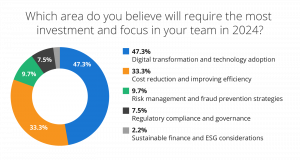The decision by SAP to end support for ECC and Business Suite 7 systems by the end of 2027 has catalyzed a significant shift within the SAP ecosystem. This strategic decision has pushed many organizations to expedite their SAP S/4HANA migration, often earlier than they had anticipated. As a result, the global SAP landscape is undergoing a profound transformation.
With IT managers already prioritizing data control, innovation, operational excellence, cybersecurity, AI adoption, data governance, and cost optimization as they attempt to navigate the complex landscape of 2024, the migration to S/4HANA has driven a need to modernize and overhaul IT infrastructures to accommodate the new platform and achieve such goals.
In this evolving landscape, AP automation will play a crucial role in future-proofing SAP S/4HANA ERP systems for organizations and ensuring it is equipped to achieve the goals of their IT strategy. By integrating AP automation, organizations can ensure that their SAP S/4HANA systems are not only optimized for current needs but are also scalable and adaptable for future challenges, making it a strategic investment in long-term business resilience.
This blog will elaborate on how integrating AP automation solutions can future-proof your SAP ERP, enhance security, support digital transformation, and ultimately streamline your procure-to-pay cycles.
IT Priorities for 2024
Control Over Data and Innovation
Achieving control over data is paramount for IT managers aiming to future-proof their SAP ERP systems. Effective data management ensures that organizations can make informed decisions, maintain regulatory compliance, and protect sensitive information. As Forbes state, “decision making can determine the success or failure of a company, so having proper data can help identify opportunities, mitigate risks and improve operational efficiency.”
Integrating AP automation into your SAP ERP centralizes data, reducing fragmentation and data silos. This consolidation of data facilitates better visibility and governance, allowing for more accurate forecasting and strategic planning. Furthermore, AP automation fosters innovation by liberating IT resources from mundane tasks, enabling them to focus on higher-value activities such as developing new technologies and improving operational efficiencies. By streamlining the accounts payable process, companies can reduce errors, enhance accuracy, and ensure timely payments, all of which contribute to a more agile and innovative business environment. Prioritizing data control and innovation through AP automation can significantly bolster an organization’s competitive edge in 2024 and beyond.
Cybersecurity and AI Adoption
Cybersecurity remains a critical concern for IT managers, especially with the increasing sophistication of cyber threats. According to KPMG, supercharging security with automation, is one of the top cybersecurity considerations as business systems move from SAP ECC to the cloud-based S/4HANA platform, furthermore the volume of data that needs protection skyrockets.
Implementing AP automation within SAP S/4HANA can significantly enhance security measures. AP automation solutions often come with built-in security features such as robust access controls and encryption, which safeguard sensitive financial data from unauthorized access and breaches. Additionally, the integration of AI technologies within AP automation can further bolster cybersecurity efforts. AI can detect unusual patterns and potential fraud in real-time, providing an additional layer of protection.
AI adoption also brings transformative benefits to the accounts payable process. Through machine learning and predictive analytics, AI can automate routine tasks, identify inefficiencies, and provide actionable insights. This not only improves accuracy but also frees up IT resources to focus on more strategic initiatives. By prioritizing cybersecurity and AI adoption, IT managers can ensure a secure, efficient, and forward-thinking SAP ERP environment in 2024 and beyond.
Data Governance and Cost Optimization
Effective data governance is essential for maintaining the integrity and reliability of data within SAP ERP systems. By integrating AP automation, organizations can enhance their data governance frameworks. Automated processes ensure consistent data capture and reduce human errors, leading to cleaner and more accurate data. This improved data quality supports compliance with regulatory standards and facilitates better decision-making.
Cost optimization is another significant benefit of AP automation. Manual accounts payable processes are often time-consuming and prone to errors, leading to increased operational costs. AP automation streamlines these processes, reducing the need for manual intervention and minimizing errors. This efficiency translates into cost savings by lowering processing costs and avoiding late payment fees. Additionally, automation can unlock early payment discounts, further contributing to cost savings.
By focusing on data governance and cost optimization, IT managers can leverage AP automation to create a more efficient, compliant, and cost-effective SAP environment.
Future-Proofing SAP with AP Automation
Limitations of SAP in AP Processes
While SAP ERP systems offer robust functionalities, they often fall short in streamlining accounts payable processes. Traditional SAP ERP setups typically involve manual data entry, which can be time-consuming and error-prone. These manual processes slow down the entire procure-to-pay cycle, leading to delays in invoice approvals and payments. Additionally, the lack of integration between different modules within SAP ERPs can result in fragmented data, making it difficult to achieve a unified view of financial operations.
Moreover, traditional SAP systems usually lack advanced features for detecting fraud and ensuring compliance, exposing organizations to financial risks. The absence of real-time data analytics capabilities further hampers the ability to make timely and informed decisions. These limitations highlight the need for AP automation solutions that can seamlessly integrate with SAP ERP, enhance data accuracy, improve compliance, and expedite the AP process. Addressing these shortcomings is crucial for future-proofing your SAP ERP system and achieving operational excellence.
For those using or considering SAP S/4HANA, certain limitations also need to be considered when it comes to the P2P cycle. Firstly, the complexity of implementation is a major hurdle; the system often requires extensive customization to align with unique business processes and workflows, significantly increasing the effort and expertise needed. Additionally, integrating SAP S/4HANA with existing systems and third-party applications can be a complex, time-consuming endeavor. The costs associated with licensing, implementation, and ongoing maintenance can be high, potentially straining budgets.
Data migration from legacy systems presents another challenge, particularly regarding compatibility and data integrity; ensuring the data is clean and standardized is crucial for a seamless transition. Managing exceptions, such as handling non-standard invoices and errors, requires robust monitoring systems to minimize disruption. Change management is also critical, as resistance to new automated processes can impede adoption and necessitate process reengineering to align with the capabilities of SAP S/4HANA.
Technical limitations, such as maintaining optimal system performance, handling large volumes of transactions and customization constraints, must also be considered. Compliance and security concerns, including regulatory compliance and data security, are paramount, requiring rigorous measures to protect sensitive financial data. Continuous maintenance and updates from SAP are necessary to ensure compatibility and leverage new features, but can be labor-intensive. Dependence on SAP for support and updates can pose challenges, particularly if responsiveness and pace of delivery does not meet your needs. Understanding and addressing these limitations is crucial for maximizing the benefits of SAP S/4HANA in your P2P cycle.
Transforming AP Processes with Integration
Integrating AP automation solutions into your SAP system can revolutionize accounts payable processes. This integration eliminates the need for manual data entry by automating invoice capture, approval workflows, and payment processing. Automated data extraction from invoices ensures higher accuracy and reduces the likelihood of errors, streamlining the entire procure-to-pay cycle.
Furthermore, integration enables real-time data exchange between the AP automation tool and the SAP ERP system. This seamless data flow enhances visibility into financial operations, making it easier to track the status of invoices and payments. Advanced analytics capabilities provided by AP automation solutions can offer actionable insights, helping IT managers make informed decisions and optimize cash flow management.
Additionally, AP automation solutions often come with built-in security features, such as encryption and access controls, enhancing the overall security of financial data. By transforming AP processes through integration, organizations can achieve greater efficiency, accuracy, and compliance, ultimately future-proofing their SAP ERP systems.
Benefits of AP Automation for IT
Built-In Security and Cloud Management
AP automation solutions like SoftCoAP offer built-in security features that significantly enhance the protection of financial data. These features include robust encryption, multi-factor authentication, and detailed access controls, ensuring that sensitive information is safeguarded against unauthorized access and cyber threats. Automated compliance checks further ensure that transactions adhere to regulatory standards, minimizing the risk of fraud and errors.
According to Amazon Web Services (AWS), the world’s most comprehensive and broadly adopted cloud, increasing numbers of organizations are moving their IT setup into the cloud to enjoy added flexibility, scale and cost benefits. These are some of the advantages that SAP customers will realize as they migrate to SAP S/4HANA. However, with this comes the need for cloud management – policies, strategies and technologies to control and maintain private, public and hybrid cloud resources.
Cloud-based AP automation platforms provide additional benefits in terms of scalability and accessibility. Built-in Cloud management allows IT managers to oversee AP processes from anywhere, providing real-time visibility into financial operations. This flexibility is particularly useful for organizations with distributed teams or multiple locations. Moreover, AP automation cloud solutions offer seamless updates and maintenance, reducing the burden on IT departments and ensuring that the system remains up-to-date with the latest security protocols and features.
By leveraging built-in security and cloud management, IT managers can ensure a secure, efficient, and flexible AP process, aligning with modern IT strategies and future-proofing their SAP ERP systems.
Driving Digital Transformation
According to the Institute of Financial Operations & Leadership (IFOL), digital transformation and technology adoption ranks as the number one area for investment and focus in 2024.

AP automation plays a pivotal role in driving digital transformation within organizations. By automating routine and manual tasks such as invoice processing, data entry, and approval workflows, AP automation frees up valuable time for IT departments. This allows IT managers to focus on strategic initiatives that drive digital innovation and enhance overall operational efficiency.
Furthermore, AP automation provides real-time data insights, enabling organizations to make data-driven decisions that support digital transformation goals. The integration of advanced technologies such as AI and machine learning within AP automation solutions can further enhance process efficiencies by predicting trends, identifying anomalies, and offering actionable insights.
Additionally, the digitalization of AP processes eliminates paper-based workflows, reducing the environmental footprint and supporting sustainability initiatives. By embracing AP automation, IT managers can foster a culture of continuous improvement and innovation, ensuring that their SAP ERP systems remain competitive and adaptable to future technological advancements. This strategic move not only enhances operational efficiency but also positions the organization as a leader in digital transformation.
SoftCo AP Automation: The Ideal Solution
Seamless Integration with SAP ERP
SoftCoAP offers seamless integration with all SAP ERP systems, ensuring a smooth transition and enhanced functionality. The integration process is designed to be straightforward, minimizing disruption to existing workflows. SoftCo’s SmartConnect technology facilitates real-time data exchange between SoftCoAP and your SAP ERP, ensuring that all financial data is synchronized and up-to-date.
This seamless integration eliminates the need for manual data entry, reducing errors and improving data accuracy. It also enables automated workflows, from invoice capture to payment processing, enhancing efficiency and speeding up the procure-to-pay cycle. Additionally, SoftCoAP supports comprehensive reporting and analytics, providing valuable insights into financial operations and enabling better decision-making.
By integrating seamlessly with SAP ERP, SoftCoAP enhances the capabilities of your existing system, providing a robust solution for managing accounts payable processes. This integration not only streamlines operations but also supports the broader goals of digital transformation and operational excellence. Many SoftCo customers from a variety of industry sectors use SAP as their including The Finish Government, apetito and Certas.
For more information on how to integrate your SAP ERP with SoftCo AP Automation, contact us today.


